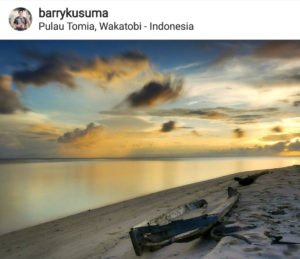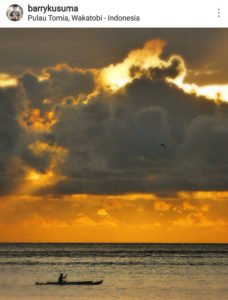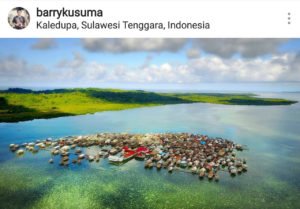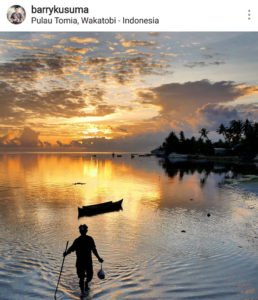Did you know that Indonesia has one of the most beautiful underwater paradises in the world? Wakatobi National Park, located in Wakatobi District, Southeast Sulawesi Province, is a diving destination that is very fascinating and a dream of many lovers under the sea in the world.
Wangi-Wangi is the capital of Wakatobi being the gateway to this underwater paradise. Wakatobi Regency consists of four main islands, namely Wangiwangi, Kalidupa, Tomia, and Binongko. So, Wakatobi is the abbreviation of the name of the four main islands. Prior to December 18, 2003, this archipelago was called the Iron Plumber Islands and is still part of Buton County.
Astronomically, Wakatobi Regency is south of the equator and like in other parts of Indonesia, Wakatobi has two seasons, the rainy season and the dry season with a temperature susceptible 19-34 degrees Celsius. Wakatobi National Park, established in 1996, with a total area of 1.39 million hectares, concerns marine biodiversity and corals that occupy one of the highest priority positions of marine conservation in Indonesia. The beauty and richness of the Wakatobi National Park area is already well known in foreign countries, especially after the Wallacea Expedition of England in 1995 which states that the region in Southeast Sulawesi is very rich in coral species. There, there are 750 of the total 850 species of coral in the world. The configuration of the depth varies from flat to sloping into the sea and in some waters areas there are steep-edged ones. The deepest part of the waters reaches 1,044 meters.

More than 112 species of corals from 13 families can be found in Wakatobi, including: Acropora formosa, A. Hyacinthus, Psammocora profundasafla, Pavona cactus, Leptoseris yabei, Fungia molucensis, Lobophyllia robusta, Merulina ampliata, Platygyra versifora, Euphyllia glabrescens, Tubastraea frondes , Stylophora pistillata, Sarcophyton throchelliophorum, and Sinularia spp living in harmony with other underwater occupants. The wealth of fish species owned by this national park are 93 species of fish including (Cephalopholus argus), takhasang (Naso unicornis), pogo-pogo (Balistoides viridescens), napoleon (Cheilinus undulatus), red fish (Lutjanus biguttatus), baronang (Siganus guttatus) , Amphiprion melanopus, Chaetodon specullum, Chelmon rostratus, Heniochus acuminatus, Lutjanus monostigma, Caesio caerularea, and others.

Wakatobi National Park is also home to several species of sea birds such as Angsa-Batu Coklat (Sula leucogaster plotus), Malay Cerek (Charadrius peronii) and King of Shrimp Erasia (Alcedo atthis) nesting. Some types of turtles also make this park their home as hawksbill (Eretmochelys imbricata), sea turtle (Caretta caretta), and turtles (Lepidochelys olivacea). Wakatobi waters have loyal guests who make the waters of Wakatobi as a playground, the guest was none other than sperm whales (Physeter macrocephalus). Usually, sperm whales are in Wakatobi in November, when the other hemisphere froze. In that month waters Wakatobi relatively warmer and abundant feed that can fill the whale's stomach. Not only that Wakatobi is also a manta ray playground (Manta ray) whose body size is classified as a giant. Manta rays are one of the unique and unique species of fish, found only in tropical waters. The formation of the Wakatobi Islands began from the time of tertiary until the end of the miocene period due to the existence of geological processes such as shearing faults that can not be separated from the workings of tectonic forces. Overall the archipelago consists of 39 islands, 3 char and 5 atolls. From the process of formation, atoll in Wakatobi is different from atolls found in other areas. Atolls in this area are formed by the sinking of the base plate. Some of the atolls seen today include Kaledupa Atoll, Kapota Atoll, and Tomia Atoll.

Wakatobi waters are located in the "Coral Tri-Angle" or coral triangle area, which has the highest coral reef diversity and other marine biodiversity in the world, covering the Philippines, Indonesia to the Solomon Islands. The presence of 25 coral reefs and ideal depths makes the waters of Wakatobi Islands National Park an ideal place for different types of marine life to live in, making marine inhabitants here have a high aesthetic and conservation value. Specifically Wakatobi Islands National Park is surrounded by beaches of coral islands along the 600 km as well as a potential beach tourism destination to be managed, scattered throughout the Wakatobi region. So not without reason if the beach area in Wakatobi is perfect for tours such as diving, snorkeling, swimming and fishing. <br /><center><hr/><em>Posted from my blog with <a href='https://wordpress.org/plugins/steempress/'>SteemPress</a> : http://jaryat.com/2018/07/22/wakatobi-must-visit-create-beach-lovers/ </em><hr/></center>